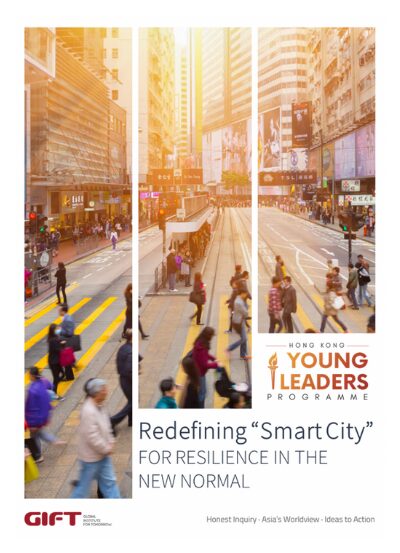Hong Kong’s recent social unrest and the global COVID-19 pandemic exposed deep fragilities in the city’s economic model. Despite its status as one of the world’s wealthiest economies, Hong Kong faces stark inequality that has led to pressing socio-economic challenges and declining quality of life for many citizens. In response, the Hong Kong Government launched the second edition of its Smart City Blueprint in 2020 to enhance mobility, living standards, environmental quality, governance, and economic resilience. Yet, beyond technological upgrades, the real opportunity lies in redefining what it means to be a smart city — one that prioritises wellbeing, inclusion, and sustainability.
In 2021, the Hong Kong Young Leaders Programme (HKYLP) took up this challenge by exploring how Hong Kong can evolve into a smart city built on resilience and quality of life. Participants examined innovative ways to address social and environmental issues while strengthening the city’s economic and social fabric.
The HKYLP produced a forward-looking report with concrete policy recommendations aimed at reimagining Hong Kong as a smart city where citizens can “live with dignity and live well.” The report outlines five key focus areas—health and wellbeing, future skills, inclusive economy, low carbon economy, and quality built environment—that together form a roadmap for a more resilient, inclusive, and sustainable city.
Proposed Recommendation
Health & Wellbeing
Support family caregivers with paid leave and partnerships for subsidised healthcare technology.
Improve children’s health outcomes through a “Healthy School” policy, active spaces, and healthy meals.
Integrate wellbeing metrics into all public policies via a Hong Kong Wellbeing Index.
Future Skills
Establish a University of Applied Sciences to expand applied learning pathways.
Create a GBA Vocational Training Hub and mutually recognised qualifications to boost talent mobility.
Increase adult learning participation through a Lifelong Development Fund and Personal Development Leave.
Inclusive Economy
Cut youth unemployment with structured apprenticeship and internship programmes.
Engage older workers through incentives and a Senior Mentor Programme.
Centralise funding access for SMEs, NGOs, and startups via a one-stop portal.
Position Hong Kong as a healthcare jobs hub to diversify employment.
Low Carbon Economy
Halve greenhouse gas emissions from the electricity sector by 2030.
Achieve an 80% reduction in plastic waste and transport emissions by 2030–35.
Enact carbon taxes, ban single-use plastics, electrify public transport, and expand charging infrastructure.
Quality Built Environment
Provide age-friendly home renovations for 100,000 low-income elderly households by 2030.
Launch pilot public open space projects and expand per-capita public open space by 2035.
Establish a Public Participation Platform to increase transparency and community engagement in urban design.


